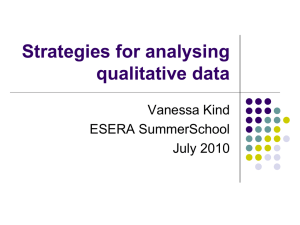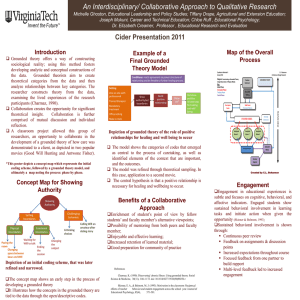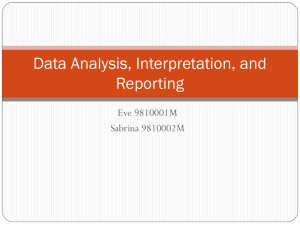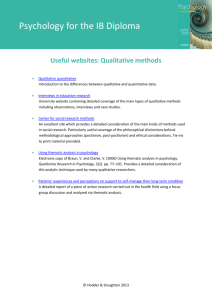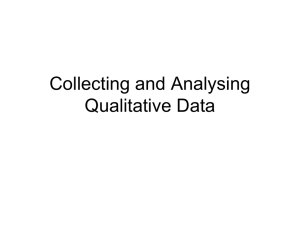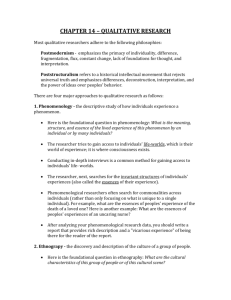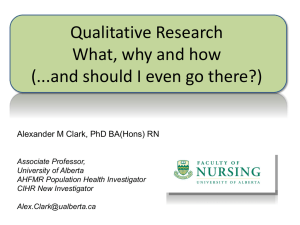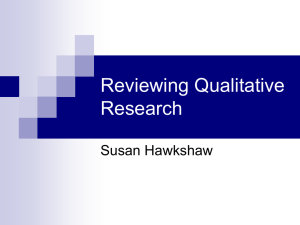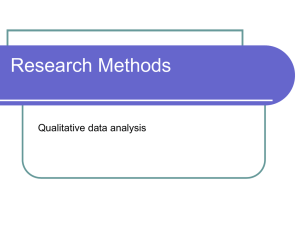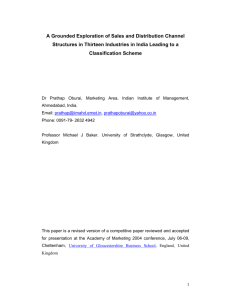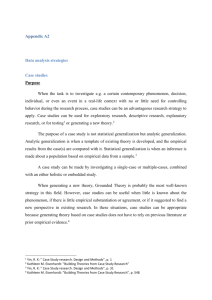Reading list - University of Leicester
advertisement
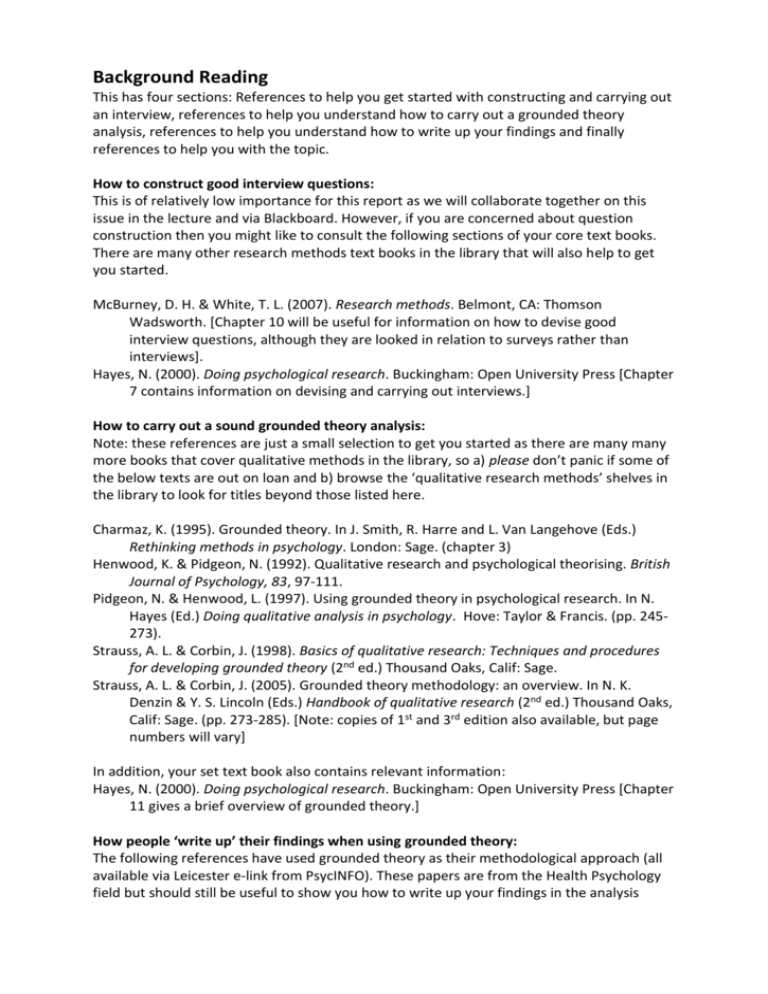
Background Reading This has four sections: References to help you get started with constructing and carrying out an interview, references to help you understand how to carry out a grounded theory analysis, references to help you understand how to write up your findings and finally references to help you with the topic. How to construct good interview questions: This is of relatively low importance for this report as we will collaborate together on this issue in the lecture and via Blackboard. However, if you are concerned about question construction then you might like to consult the following sections of your core text books. There are many other research methods text books in the library that will also help to get you started. McBurney, D. H. & White, T. L. (2007). Research methods. Belmont, CA: Thomson Wadsworth. [Chapter 10 will be useful for information on how to devise good interview questions, although they are looked in relation to surveys rather than interviews]. Hayes, N. (2000). Doing psychological research. Buckingham: Open University Press [Chapter 7 contains information on devising and carrying out interviews.] How to carry out a sound grounded theory analysis: Note: these references are just a small selection to get you started as there are many many more books that cover qualitative methods in the library, so a) please don’t panic if some of the below texts are out on loan and b) browse the ‘qualitative research methods’ shelves in the library to look for titles beyond those listed here. Charmaz, K. (1995). Grounded theory. In J. Smith, R. Harre and L. Van Langehove (Eds.) Rethinking methods in psychology. London: Sage. (chapter 3) Henwood, K. & Pidgeon, N. (1992). Qualitative research and psychological theorising. British Journal of Psychology, 83, 97-111. Pidgeon, N. & Henwood, L. (1997). Using grounded theory in psychological research. In N. Hayes (Ed.) Doing qualitative analysis in psychology. Hove: Taylor & Francis. (pp. 245273). Strauss, A. L. & Corbin, J. (1998). Basics of qualitative research: Techniques and procedures for developing grounded theory (2nd ed.) Thousand Oaks, Calif: Sage. Strauss, A. L. & Corbin, J. (2005). Grounded theory methodology: an overview. In N. K. Denzin & Y. S. Lincoln (Eds.) Handbook of qualitative research (2nd ed.) Thousand Oaks, Calif: Sage. (pp. 273-285). [Note: copies of 1st and 3rd edition also available, but page numbers will vary] In addition, your set text book also contains relevant information: Hayes, N. (2000). Doing psychological research. Buckingham: Open University Press [Chapter 11 gives a brief overview of grounded theory.] How people ‘write up’ their findings when using grounded theory: The following references have used grounded theory as their methodological approach (all available via Leicester e-link from PsycINFO). These papers are from the Health Psychology field but should still be useful to show you how to write up your findings in the analysis section. There are of course many other papers out there so feel free to explore the available literature to find them. Meticulous coding is important BUT this is worth nothing if you cannot then communicate what you have found in a clear concise way. Draucker, D. B., Martsolf, D. S., Ratchneewan, R. & Thomas, B. (2007). Theoretical sampling and category development in grounded theory. Qualitative Health Research, 17, 11371148. Hoyt, M. A. & Kennedy, C. L. (2008). Leadership and adolescent girls: A qualitative study of leadership development. American Journal of Community Psychology, 42, 203-219. Larsson, I. E., Sahlsten, M. J. M., Sjöstörm, B., Lindencrona, C. S. C., & Plos, K. A. E. (2007). Patient participation in nursing care from a patient perspective: a grounded theory study. Scandinavian Journal of Caring Sciences, 21, 313-320. Previous research on attitudes towards computers and books: These texts are all available via PsycINFO and Leicester E-Link. You should already be familiar with these texts from Practical 1, so your markers will expect to see evidence of wider reading. However, to ensure you are on the right track these suggested texts should be used as a basis for your work on this topic. Garland, K. J., & Noyes, J. M. (2004). Computer experience: A poor predictor of computer attitudes. Computers in Human Behavior, 20(6), 823-840. Garland, K. J., & Noyes, J. M. (2004). Changes in learning expectations and confidence toward computers: A study of five successive years of undergraduate. Journal of Educational Computing Research, 31, 273-279. Garland, K. J., & Noyes, J. M. (2005). Attitudes and confidence towards computers and books as learning tools: A cross-sectional study of student cohorts. British Journal of Educational Technology. 36, 85-91. Garland, K. J., & Noyes, J. M. (2008). A review of changing attitudes towards computers in educational settings. In T. B. Scott & J. I. Livingston (Eds.) Leading Edge – Educational Technology. New York: Nova Science. (pp. 195-209). Noyes, J. M., & Garland, K. J. (2005). Students’ attitudes towards books and computers. Computers in Human Behavior, 21(2), 233-241. Noyes, J. M., & Garland, K. J. (2006). Explaining students’ attitudes towards books and computers. Computers in Human Behavior, 22(3), 351-363.
